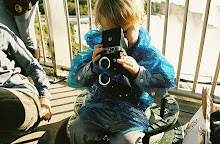
hi mom! 
I allowed myself the french green bean casserole, the sweet potatoes with crunchy mini-marshmellows, the Pillsbury croissants with baked-in butter, the Waldorf salad, the yellow squash smothered in American cheese, the mashed potatoes and the macaroni and cheese and a few homemade mini-biscuits, but this was my first Thanksgiving as the lone Vegetarian in the family, so I placidly declined the turkey and the gravy. My older brothers and one remaining older male cousin teased me and rolled their eyes, but I was learning the pleasure of resolute refusal. My mother imagined herself to be left of liberal in her parenting skills, and my aunt, having recently lost a son to a drunk driver, was even more charitable than usual. They didn’t necessarily agree with or understand this new and first semi-political (but seemingly harmless) stand I’d ever taken in my life, but they enjoyed indulging me. With all these brothers and male cousins and uncles and Dads around, they discerned that someone had to be on my side. So they told their sons to shut up and cut me an obsene slice of pumpkin pie camoflagued beneath melting mounds of Cool Whip.
Later, sprawled on the floor in-between several surfboards I was forbidden to touch and a football-only television screen, I commiserated with The Scarlet Letter and some leftover Geometry homework. I was fussy, but not because of the Tryptophan I’d missed. I’d put on some weight recently, and my jeans were uncomfortable and, glancing in the bathroom mirror of the St. Augustine Beach condominium we’d rented for the weekend, I was pretty sure that I had sprouted one of those asses that a rap song I can no longer remember had popularized as being so big "you can see it from behind." I’d been naturally underweight my whole life, and kind of tall, so I’d never had to pay attention to what I ate. But in the eighth grade I got mono and for about four weeks was almost completely incapable of eating. I lost so much weight that people were asking me if I had a problem. "Sure, I’d say: Mono. Great diet. Ever tried it?" But even though I had neither wanted nor needed to lose the weight, once I’d felt that bony sensation of skull against protuberant elbow or kneebone against kneebone, I was no longer comfortable with my body’s natural pillows. I never (and even now at almost thirty barely have) developed breasts or hips, so I was unfamiliar with the "growing pains" my girlfriends had complained of, and with the disgust I later read some girls experienced as their bodies morphed during puberty. I had gone to bed every night as a pre-pubescent girl praying for boobs like Loni Anderson’s and every time Cannonball Run II came on HBO I’d stay up late studying Marilu Henner’s curves. But my recent, and probably healthy, weight-gain didn’t seem womanly to me at all: it seemed monstrous. I wasn’t growing breasts or hips; I was just getting fat. I’d read that Paulina Porizkova never worried about putting on weight because, if she did, her breasts just got larger, and if she lost weight, she looked better in clothes. I knew there was no chance of my body following the first route, but the second option seemed more democratic.
I was on the Varsity football cheerleading squad that year and had been elected homecoming "princess" for my grade, but my emergent desirability as a conventional object of femininity both excited and confused me. My mom was a semi-out lesbian who had never dated a woman who weighed in at less than 200 pounds, and my horrified reactionary way of handling her (confusing-to-my-conventionally-raised-self) desires was to understand her sexuality as a kind of fat. Lesbianism equaled chocolate mousse for breakfast which begat bodies who strove to emulate the Venus of Willendorff. These women baked pot brownies, gave tarot readings on the lawn (any lawn), and spent their afternoons picking buttercups naked at the edge of a pond whose sandy shores they’d built their first of many communes on the banks of, as their as-yet-to-be radicalized out of redneck subjectivity children gagged in the background and kicked their names into the dirt. But these recently divorced mothers faced a difficult project. Each afternoon brought a breezy reminder that this pond made its home on the outskirts of papermill country in northern Florida, rather than the northern Californian coasts of which they dreamed. They were in hell and it smelled like shit, and no amount of patchouli or sandalwood incense could turn Palatka into Bernal Heights. But huge batches of fettucine alfredo and BBQ tofu and lessons in Indian cookery were at least culinary steps toward utopia, both in its literal and its generally understood meanings. At least they could eat like they lived on the Farm, and no one was around to remind them of the diets they were breaking. Food was suddenly revolutionary. No more deviled eggs, no more jello molds. Just the Enchanted Broccoli Forest or Moosewood cookbooks.
I’d spent my entire middle and high school careers petrified that one of my friends would detect my devious heritage, but my recent achievements indicated that I was passing just fine. Nonetheless, if I was gaining all of this weight, literally softening, what else might I have been letting slip? So, at the prime of my meaningless popularity, I sought out food so bland that it took away my desire to eat, and represented my general lack of desire for anything passionate and therefore "obviously" lesbian. Fat free cottage cheese, fat free mozarella, diet bars, yogurt, celery sticks and diet cokes got me through the day, and onto multiple pages of the yearbook.
Unlike most of the other girls on the squad, I’d spent half of my life trying to live differently from the example set to me by my parents. Neither scandalous sexuality nor illegal drug use interested me because I associated those things with my parents, so, gross. They unwittingly made successful Gatsbys out of each of their three children. My mom said I could be a cheerleader if I wanted to, but my dad would have to pay for it, which he gladly did, so it seemed like a minor revolt; however, I longed to erect a deeper cleavage between my mother, desire, my body, and myself.
click here for sonic youth's appropriate cover of The Carpenters' Superstar! My first MP3!




